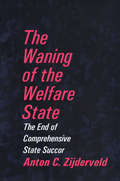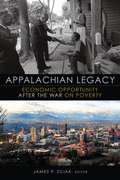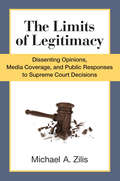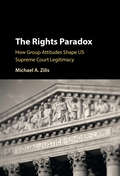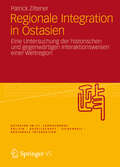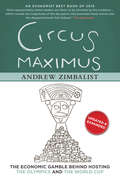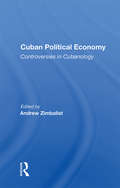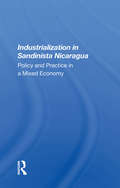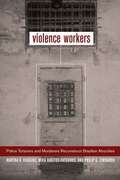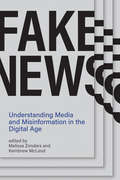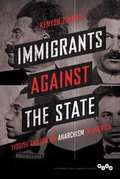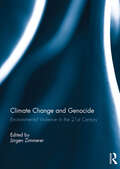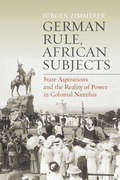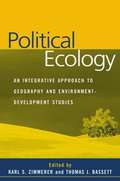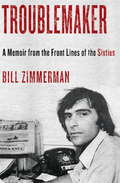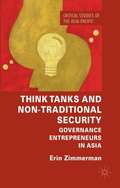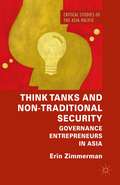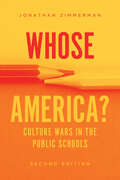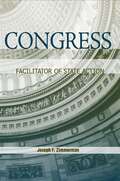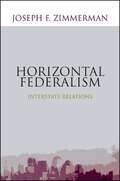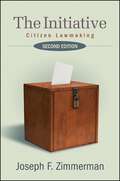- Table View
- List View
The Waning of the Welfare State
by Anton ZijderveldThe welfare state in postwar Western Europe has been extended and intensified in a spectacular manner. Today, "welfare" represents a complex mix of services covering health, education, welfare, the arts, leisure, and social security. Anton C. Zijderveld is of the opinion that Europe's vast, comprehensive welfare state is becoming leaner and meaner, heading down a more sober path toward decentralization and deregulation, which only, but not merely, secures order for its citizens and shields society's vulnerable. As the millennium approaches, Zijderveld believes Europe is experiencing a cultural renaissance and a socioeconomic and political reformation in which the market will flourish and civil society will prosper.The Waning of the Welfare State focuses on the transformation of the welfare state in Europe over a four-decade period. Zijderveld employs the democratic triangle theoretical model, in which democracy is viewed as a system in which state, market, and civil society are held in precious balance. If one component supersedes the other two, democracy is endangered. In its 1960s and 1970s heyday, the state took center stage at the expense of the market and civil society; social democracy was the prevailing ideology. In the 1980s the market triumphed, often at the expense of both the state and civil society; this was the decade of liberalism. Today, civil society prevails, albeit at risk of being injurious to state and market. Ideologically, this is the decade of conservatism.Zijderveld sees a future "Americanization" of European social policy producing a fortuitously balanced coalition of social democracy, liberalism, and conservatism; a place where safety and order, prosperity and economic participation, and social participation and meaningful interactions flourish equally. This transformation carries many risks. But it will, in the end, strengthen Europe's political, economic, and sociocultural stamina. If it also draws the Atlantic partners closer together, as Zijderveld believes it does, the chances of another European communist, libertarian, or fascist Gtterdommerung will remain remote. Zijderveld presents useful concepts in a highly organized fashion. He has produced a very important book for American readers who will, hopefully, discover, beyond the often vast differences, some basic similarities of structures and developments within the European welfare state.
Appalachian Legacy
by James P. ZiliakIn 1964 President Lyndon Johnson traveled to Kentucky's Martin County to declare war on poverty. The following year he signed the Appalachian Regional Development Act, creating a state-federal partnership to improve the region's economic prospects through better job opportunities, improved human capital, and enhanced transportation. As the focal point of domestic antipoverty efforts, Appalachia took on special symbolic as well as economic importance. Nearly half a century later, what are the results? Appalachian Legacy provides the answers.Led by James P. Ziliak, prominent economists and demographers map out the region's current status. They explore important questions, including how has Appalachia fared since the signing of ARDA in 1965? How does it now compare to the nation as a whole in key categories such as education, employment, and health? Was ARDA an effective place-based policy for ameliorating hardship in a troubled region, or is Appalachia still mired in a poverty trap? And what lessons can we draw from the Appalachian experience?In addition to providing the reports of important research to help analysts, policymakers, scholars, and regional experts discern what works in fighting poverty, Appalachian Legacy is an important contribution to the economic history of the eastern United States.
Appalachian Legacy
by James P. ZiliakIn 1964 President Lyndon Johnson traveled to Kentucky's Martin County to declare war on poverty. The following year he signed the Appalachian Regional Development Act, creating a state-federal partnership to improve the region's economic prospects through better job opportunities, improved human capital, and enhanced transportation. As the focal point of domestic antipoverty efforts, Appalachia took on special symbolic as well as economic importance. Nearly half a century later, what are the results? Appalachian Legacy provides the answers.Led by James P. Ziliak, prominent economists and demographers map out the region's current status. They explore important questions, including how has Appalachia fared since the signing of ARDA in 1965? How does it now compare to the nation as a whole in key categories such as education, employment, and health? Was ARDA an effective place-based policy for ameliorating hardship in a troubled region, or is Appalachia still mired in a poverty trap? And what lessons can we draw from the Appalachian experience?In addition to providing the reports of important research to help analysts, policymakers, scholars, and regional experts discern what works in fighting poverty, Appalachian Legacy is an important contribution to the economic history of the eastern United States.
The Limits Of Legitimacy: Dissenting Opinions, Media Coverage, And Public Responses To Supreme Court Decisions
by Michael A. ZilisWhen the U. S. Supreme Court announces a decision, reporters simplify and dramatize the complex legal issues by highlighting dissenting opinions and thus emphasizing conflict among the justices themselves. This sometimes sensationalistic coverage fosters public controversy over specific rulings despite polls that show that Americans strongly believe in the Court's legitimacy as an institution. In The Limits of Legitimacy, Michael A. Zilis illuminates this link between case law and public opinion. Drawing on a diverse array of sources and methods, he employs case studies of eminent domain decisions, analysis of media reporting, an experiment to test how volunteers respond to media messages, and finally the natural experiment of the controversy over the Affordable Care Act, popularly known as Obamacare. Zilis finds that the media tends not to quote from majority opinions. However, the greater the division over a particular ruling among the justices themselves, the greater the likelihood that the media will criticize that ruling, characterize it as "activist," and employ inflammatory rhetoric. He then demonstrates that the media's portrayal of a decision, as much as the substance of the decision itself, influences citizens' reactions to and support for it. This meticulously constructed study and its persuasively argued conclusion advance the understanding of the media, judicial politics, political institutions, and political behavior. Book jacket.
The Rights Paradox: How Group Attitudes Shape US Supreme Court Legitimacy
by Michael A. ZilisThe US Supreme Court is the chief institution responsible for guarding minority rights and equality under the law, yet, in order to function authoritatively, the Court depends on a majority of Americans to accept its legitimacy and on policymakers to enforce its rulings. The Rights Paradox confronts this tension, offering a careful conceptualization and theory of judicial legitimacy that emphasizes its connection to social groups. Zilis demonstrates that attitudes toward minorities and other groups are pivotal for shaping popular support for the Court, with the Court losing support when it rules in favor of unpopular groups. Moreover, justices are aware of these dynamics and strategically moderate their decisions when concerned about the Court's legitimacy. Drawing on survey and experimental evidence, as well as analysis of Court decision-making across many recent high-profile cases, Zilis examines the implications for 'equal justice under the law' in an era of heightened polarization and conflict.
Regionale Integration in Ostasien
by Patrick ZiltenerEine Weltregion ist eine Subagglomeration, die sich durch eine signifikant höhere Interaktionsdichte in einem umfassenderen, heute globalen Weltsystem auszeichnet. Stellt Ostasien - von China, Korea und Japan im Norden bis Indonesien im Süden - eine solche Weltregion dar? Zur Beantwortung der Frage nach dem Regionencharakter Ostasiens werden in dieser umfassenden Studie regionale und globale Geschehenszusammenhänge in ihrer historischen Tiefe rekonstruiert. Seit der Verstetigung der Kontakte in den ersten Jahrhunderten der westlichen Zeitrechnung erlebte Ostasien mehrere Schübe intensivierter wirtschaftlicher, politischer und kultureller Integration. Nach einem Tiefpunkt im Gefolge des 2. Weltkrieges, der Entkolonialisierung und Unabhängigkeitskriege ermöglichten die Öffnungs- und Reformprozesse seit den späten 1970er Jahren die rasche Wiederverflechtung der Region. Detailliert untersucht werden das oft informelle Zusammenspiel wirtschaftlicher und politischer Regionalisierung, die Funktionen regionaler Organisationen wie etwa der Asiatischen Entwicklungsbank (ADB) und der transpazifischen Asia Pacific Economic Cooperation (APEC), sowie die außenpolitischen Interessen und Strategien Japans, Chinas und der ASEAN-Länder im sich herausbildenden ASEAN plus-System in Ostasien. Es geht dabei um Weichenstellungen, die nicht nur Ostasien als Weltregion auf dem Weg zu einer Gemeinschaft, sondern auch die politische Weltökonomie über Jahrzehnte hinaus prägen werden.
Circus Maximus
by Andrew ZimbalistAthletes compete for national honor in Olympic and World Cup games. But the road to these mega events is paved by big business. We all know who the winners on the field are-but who wins off the field?The numbers are staggering: China spent $40 billion to host the 2008 Summer Olympic Games in Beijing and Russia spent $50 billion for the 2014 Sochi Winter Games. Brazil's total expenditures are thought to have been as much as $20 billion for the World Cup this summer and Qatar, which will be the site of the 2022 World Cup, is estimating that it will spend $200 billion.How did we get here? And is it worth it? Those are among the questions noted sports economist Andrew Zimbalist answers in Circus Maximus: The Economic Gamble Behind Hosting the Olympics and the World Cup. Both the Olympics and the World Cup are touted as major economic boons for the countries that host them, and the competition is fierce to win hosting rights. Developing countries especially see the events as a chance to stand in the world's spotlight.Circus Maximus traces the path of the Olympic Games and the World Cup from noble sporting events to exhibits of excess. It exposes the hollowness of the claims made by their private industry boosters and government supporters, all illustrated through a series of case studies ripping open the experiences of Barcelona, Sochi, Rio, and London. Zimbalist finds no net economic gains for the countries that have played host to the Olympics or the World Cup. While the wealthy may profit, those in the middle and lower income brackets do not, and Zimbalist predicts more outbursts of political anger like that seen in Brazil surrounding the 2014 World Cup.
Cuban Political Economy: Controversies In Cubanology
by Andrew ZimbalistThis comprehensive and authoritative book assesses in theoretical and empirical terms some of the most widely debated issues in the study of Cuban political economy. It presents a broad critique of the mainstream scholarship in the United States on Cuban political economy.
Industrialization In Sandinista Nicaragua: Policy And Practice In A Mixed Economy
by Andrew ZimbalistThis book explores whether the Sandinista 'mixed economy'—a 'transitional' mixed economy—could have been stable if the Sandinistas had been able to pursue their industrialization strategy for a longer period of time. It explains why Nicaragua's mixed economy was stable for almost eleven years.
Violence Workers: Police Torturers and Murderers Reconstruct Brazilian Atrocities
by Philip Zimbardo Martha K. Huggins Mika Haritos-FatourosOf the twenty-three Brazilian policemen interviewed in depth for this landmark study, fourteen were direct perpetrators of torture and murder during the three decades that included the 1964-1985 military regime. These "violence workers" help answer questions that haunt today's world.
Fake News: Understanding Media and Misinformation in the Digital Age (Information Policy)
by Melissa Zimdars Kembrew McLeodNew perspectives on the misinformation ecosystem that is the production and circulation of fake news.What is fake news? Is it an item on Breitbart, an article in The Onion, an outright falsehood disseminated via Russian bot, or a catchphrase used by a politician to discredit a story he doesn't like? This book examines the real fake news: the constant flow of purposefully crafted, sensational, emotionally charged, misleading or totally fabricated information that mimics the form of mainstream news. Rather than viewing fake news through a single lens, the book maps the various kinds of misinformation through several different disciplinary perspectives, taking into account the overlapping contexts of politics, technology, and journalism.The contributors consider topics including fake news as “disorganized” propaganda; folkloric falsehood in the “Pizzagate” conspiracy; native advertising as counterfeit news; the limitations of regulatory reform and technological solutionism; Reddit's enabling of fake news; the psychological mechanisms by which people make sense of information; and the evolution of fake news in America. A section on media hoaxes and satire features an oral history of and an interview with prankster-activists the Yes Men, famous for parodies that reveal hidden truths. Finally, contributors consider possible solutions to the complex problem of fake news—ways to mitigate its spread, to teach students to find factually accurate information, and to go beyond fact-checking.ContributorsMark Andrejevic, Benjamin Burroughs, Nicholas Bowman, Mark Brewin, Elizabeth Cohen, Colin Doty, Dan Faltesek, Johan Farkas, Cherian George, Tarleton Gillespie, Dawn R. Gilpin, Gina Giotta, Theodore Glasser, Amanda Ann Klein, Paul Levinson, Adrienne Massanari, Sophia A. McClennen, Kembrew McLeod, Panagiotis Takis Metaxas, Paul Mihailidis, Benjamin Peters, Whitney Phillips, Victor Pickard, Danielle Polage, Stephanie Ricker Schulte, Leslie-Jean Thornton, Anita Varma, Claire Wardle, Melissa Zimdars, Sheng Zou
Immigrants against the State: Yiddish and Italian Anarchism in America
by Kenyon ZimmerFrom the 1880s through the 1940s, tens of thousands of first- and second-generation immigrants embraced the anarchist cause after arriving on American shores. Kenyon Zimmer explores why these migrants turned to anarchism, and how their adoption of its ideology shaped their identities, experiences, and actions. Zimmer focuses on Italians and Eastern European Jews in San Francisco, New York City, and Paterson, New Jersey. Tracing the movement's changing fortunes from the pre-World War I era through the Spanish Civil War, Zimmer argues that anarchists, opposed to both American and Old World nationalism, severed all attachments to their nations of origin but also resisted assimilation into their host society. Their radical cosmopolitan outlook and identity instead embraced diversity and extended solidarity across national, ethnic, and racial divides. Though ultimately unable to withstand the onslaught of Americanism and other nationalisms, the anarchist movement nonetheless provided a shining example of a transnational collective identity delinked from the nation-state and racial hierarchies.
The Conversation on Biotechnology (Critical Conversations)
by Marc ZimmerFrom the contributors to The Conversation, this collection of essays by leading experts in biotechnology provides foundational knowledge on a range of topics, from CRISPR gene sequencing to the ethics of GMOs and "designer babies."In The Conversation on Biotechnology, editor Marc Zimmer collects essays from The Conversation U.S. by top scholars and experts in the field, who present a primer on the latest biotechnology research, the overwhelming possibilities it offers, and the risks of its abuse. From an overview of CRISPR technology and gene editing in GMOs to the ethical questions surrounding "designer babies" and other applications of biotechnology in humans, it highlights the major implications biotechnology will bring for health and society. Topics range from the spectacular use of light to fire individual neurons in the brain to making plant-based meats; from curbing diseases with genetically modified mosquitoes to looking back on 40 years of opinions on IVF babies.The Critical Conversations series collects essays from top scholars on timely topics, including water, biotechnology, gender diversity, gun culture, and more, originally published on the independent news site The Conversation U.S.Contributors: Nathan Ahlgren, Ivan Anishchenko, Trine Antonsen, Jennifer Barfield, Pedro Belda-Ferre, Ari Berkowitz, Adeline Boettcher, Jason Delbourne, Kevin Doxzen, Mo Ebrahimkhani, Eleanor Feingold, J. Benjamin Hurlbut, Cecile Janssens, Samira Kiani, Amanda Kowalczyk, Mariana Lamas, Andrew Lapworth, Rebecca Mackelprang, Kathleen Merrigan, Saman Naghieh, Sean Nee, Dimitri Perrin, Christopher Preston, Jason Rasgon, Penny Riggs, Jason Robert, Oliver Rogoyski, Gary Samore, Sahotra Sarkar, George E. Seidel, Patricia A. Stapleton, Craig W. Stevens, Paul B. Thompson, Christopher Tuggle, Vikramaditya G. Yadav, Marc Zimmer
Climate Change and Genocide: Environmental Violence in the 21st Century
by Jürgen ZimmererClimate change caused by human activity is the most fundamental challenge facing mankind in the 21st century, since it will drastically alter the living conditions of millions of people, mainly in the Global South. Environmental violence, including resource crises such as peak fossil fuel, will lie at the heart of future conflicts. However, Genocide Studies have so far neglected this subject, due to the emphasis that traditional genocide scholarship places on ideology and legal prosecution, leading to a narrow understanding of the driving forces of genocide. This books aims at changing this, initiating a dialogue between scholars working in the areas of climate change and genocide. Research into genocide as well as climate change is a highly interdisciplinary endeavour, transcending the boundaries of established disciplines. Contributions to this book address this by approaching the subject from a wide array of methodological, theoretical, disciplinary and regional perspectives. As all the contributions show, climate change is a major threat multiplier for violence or non-violent destruction and any understanding of prevention needs to take this into account. They offer a basis for much needed Critical Prevention Studies, which aims at sustainable prevention.This book was originally published as a special issue of the International Journal of Human Rights.
German Rule, African Subjects: State Aspirations and the Reality of Power in Colonial Namibia
by Jürgen ZimmererAlthough it lasted only thirty years, German colonial rule dramatically transformed South West Africa. The colonial government not only committed the first genocide of the twentieth century against the Herero and Nama, but in their efforts to establish a “model colony” and “racial state,” they brought about even more destructive and long-lasting consequences. In this now-classic study—available here for the first time in English—the author provides an indispensable account of Germany's colonial utopia in what is present-day Namibia, showing how the highly rationalized planning of Wilhelmine authorities ultimately failed even as it added to the profound immiseration of the African population.
Political Ecology
by Karl Zimmerer Thomas J. BassettThis volume offers a unique, integrative perspective on the political and ecological processes shaping landscapes and resource use across the global North and South. Twelve carefully selected case studies demonstrate how contemporary geographical theories and methods can contribute to understanding key environment-and-development issues and working toward effective policies. Topics addressed include water and biodiversity resources, urban and national resource planning, scientific concepts of resource management, and ideas of nature and conservation in the context of globalization. Giving particular attention to evolving conceptions of nature-society interaction and geographical scale, an introduction and conclusion by the editors provide a clear analytical focus for the volume and summarize important developments and debates in the field.
An Antiwar Delegation in Hanoi: from Troublemaker
by Bill ZimmermanBill Zimmerman put his life at risk for the greater social good when he smuggled medicines to the front lines in North Vietnam and spent time filming in Hanoi under U.S. bombardment. In his extraordinary political memoir, he takes us into the hearts and minds of those making the social revolution of the sixties. Zimmerman—who crossed paths with political organizers and activists like Abbie Hoffman, Daniel Ellsberg, César Chávez, Jane Fonda, and Tom Hayden—captures a groundbreaking zeitgeist that irrevocably changed the world as we knew it.A Vintage Shorts Vietnam Selection. An ebook short.
Troublemaker: A Memoir from the Front Lines of the Sixties
by Bill ZimmermanThe political memoir as rousing adventure story--a sizzling account of a life lived in the thick of every important struggle of the era. April 1973: snow falls thick and fast on the Badlands of South Dakota. It has been more than five weeks since protesting Sioux Indians seized their historic village of Wounded Knee, and the FBI shows no signs of abandoning its siege. When Bill Zimmerman is asked to coordinate an airlift of desperately needed food and medical supplies, he cannot refuse; flying through gunfire and a mechanical malfunction, he carries out a daring dawn raid and successfully parachutes 1,500 pounds of food into the village. The drop breaks the FBI siege, and assures an Indian victory. This was not the first--or last--time Bill Zimmerman put his life at risk for the greater social good. In this extraordinary memoir, Zimmerman takes us into the hearts and minds of those making the social revolution of the sixties. He writes about registering black voters in deepest, most racist Mississippi; marching with Martin Luther King Jr. in Chicago; helping to organize the 1967 march on the Pentagon; fighting the police at the 1968 Democratic convention; mobilizing scientists against the Vietnam War and the military's misuse of their discoveries; smuggling medicines to the front lines in North Vietnam; spending time in Hanoi under U.S. bombardment; and founding an international charity, Medical Aid for Indochina, to deliver humanitarian assistance. Zimmerman--who crossed paths with political organizers and activists like Abbie Hoffman, Daniel Ellsberg, César Chávez, Jane Fonda, and Tom Hayden--captures a groundbreaking zeitgeist that irrevocably changed the world as we knew it.
Think Tanks and Non-Traditional Security: Governance Entrepreneurs in Asia (Critical Studies of the Asia-Pacific)
by Erin ZimmermanAsian security institutions have struggled to adapt to the so-called 'non-traditional' security issues that characterise the strategic landscape of the 21st century. The resulting gaps in governance have increasingly been filled by think tanks, which have arguably begun to change the way that Asian security is governed.
Think Tanks and Non-Traditional Security: Governance Entrepreneurs in Asia (Critical Studies of the Asia-Pacific)
by Erin ZimmermanAsian security institutions have struggled to adapt to the so-called 'non-traditional' security issues that characterise the strategic landscape of the 21st century. The resulting gaps in governance have increasingly been filled by think tanks, which have arguably begun to change the way that Asian security is governed.
Whose America?: Culture Wars in the Public Schools
by Jonathan ZimmermanIn this expanded edition of his 2002 book, Zimmerman surveys how battles over public education have become conflicts at the heart of American national identity. Critical Race Theory. The 1619 Project. Mask mandates. As the headlines remind us, American public education is still wracked by culture wars. But these conflicts have shifted sharply over the past two decades, marking larger changes in the ways that Americans imagine themselves. In his 2002 book, Whose America?, Zimmerman predicted that religious differences would continue to dominate the culture wars. Twenty years after that seminal work, Zimmerman has reconsidered: arguments over what American history is, what it means, and how it is taught have exploded with special force in recent years. In this substantially expanded new edition, Zimmerman meditates on the history of the culture wars in the classroom—and on what our inability to find common ground might mean for our future.
Whose America?: Culture Wars in the Public Schools
by Jonathan ZimmermanIn this expanded edition of his 2002 book, Zimmerman surveys how battles over public education have become conflicts at the heart of American national identity. Critical Race Theory. The 1619 Project. Mask mandates. As the headlines remind us, American public education is still wracked by culture wars. But these conflicts have shifted sharply over the past two decades, marking larger changes in the ways that Americans imagine themselves. In his 2002 book, Whose America?, Zimmerman predicted that religious differences would continue to dominate the culture wars. Twenty years after that seminal work, Zimmerman has reconsidered: arguments over what American history is, what it means, and how it is taught have exploded with special force in recent years. In this substantially expanded new edition, Zimmerman meditates on the history of the culture wars in the classroom—and on what our inability to find common ground might mean for our future.
Congress: Facilitator of State Action
by Joseph F. ZimmermanReassessing the relationship between the federal government and the states, Congress: Facilitator of State Action examines how the U.S. Congress routinely and necessarily devolves power to the states. A host of congressional statutes reveal the ways in which the U.S. Congress facilitates state action to solve certain problems, including the enforcement of respective criminal laws. Financial and nonfinancial assistance to the states are elucidated and assessed, including technical assistance and the establishment of such programs as the National Driver Register. Comprehensive and timely, this book illuminates a key dynamic in the country's political system and offers a more complex and accurate theory of federalism.Joseph F. Zimmerman is Professor of Political Science at the University at Albany, State University of New York. His many books include Contemporary American Federalism: The Growth of National Power, Second Edition; The Silence of Congress: State Taxation of Interstate Commerce; and The Government and Politics of New York State: Second Edition, all published by SUNY Press.
Horizontal Federalism: Interstate Relations
by Joseph F. ZimmermanCooperative interstate relations are essential for the maintenance of the economic union and the political union established by a confederacy or a federacy. This suggests that interstate relations would be featured prominently in the literature of the U.S. federal system, yet relatively few scholars have studied horizontal state relations. This volume provides detailed information and an analysis of interstate relations, and advances recommendations to improve the economic and political union. The ultimate goal is to stimulate scholarly research on important yet neglected interstate issues.
The Initiative: Citizen Lawmaking, Second Edition
by Joseph F. ZimmermanThe initiative is the product of the populist movement, which in the late nineteenth century sought to increase voter control of what were viewed as unrepresentative state and local governments. Today, twenty-four states allow registered voters to place proposed state laws on the referendum ballot, and eighteen states authorize voters to place proposed state constitutional amendments on the referendum ballot by collecting a specified number of valid voter signatures. Numerous local governments have a charter provision or a state law provision allowing voters to employ the popular lawmaking device. In The Initiative, Second Edition, Joseph F. Zimmerman traces the origin and spread of the initiative in the United States. The initiative has been a controversial device since first being introduced in South Dakota in 1898, with arguments both in support and in opposition. Zimmerman examines and evaluates both the legal foundation of the initiative, and the arguments against its use. He then concludes with a chapter that develops model constitutional, statutory, and local government charter provisions to assist jurisdictions and their voters contemplating adoption of the initiative or amendment of already existing constitutional, statutory, and charter initiative provisions.
